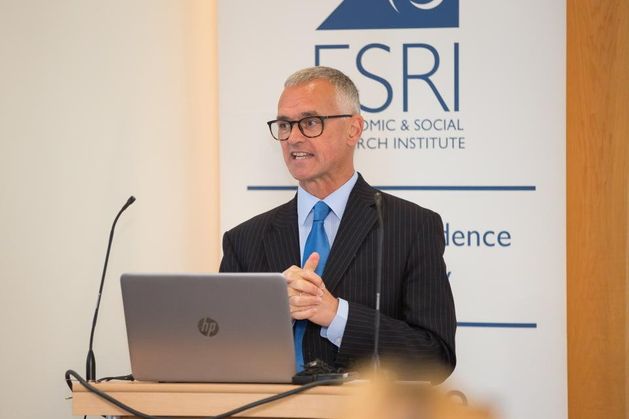Joining the Central Bank and the Irish Fiscal Advisory Council in advising against excessive extra spending in the Budget on October 7, the research institute said it has concerns about the fiscal stance being adopted by the Government.
Professor Alan Barrett of the ESRI has told the Oireachtas Committee on Budgetary Oversight that current policy risks “overheating” the economy, by adding stimulus when it is not needed.
Other budgetary watchdogs have also argued that running a deficit is not advisable when an economy is performing well, and is already at or above its potential output. Sound economics suggests a counter-cyclical policy.
“Ireland’s fiscal policy looks pro-cyclical right now, which creates immediate risks such as overheating, and longer term risks such as the need to continue with a pro-cyclical fiscal stance in any downturn, thereby magnifying the downturn,” TDs and senators were told.
“We see merit in moving to a situation where underlying surpluses are achieved.”
He added: “The last few years have provided a set of circumstances is which loose fiscal policy has been both warranted (Covid, cost of living crisis related to Ukraine) and facilitated (strong corporate tax revenues). It could be argued that a degree of looseness inevitably continued in the run-up to the General Election in 2024. In Budget 2026, it is important that sound fiscal management moves to the fore again, including adherence to announced spending plans throughout 2026.”
Finance Minister Paschal Donohoe has said he will introduce a €9.4bn package of extra spending and tax cuts in the Budget.
The ESRI pointed out that “overheating” is not just about feeding inflation, but also leads to capacity constraints, which could hamper delivery of the National Development Plan and housing targets.
However, in a suggestion that Mr Donohoe should again introduce cost-of-living measures in the Budget, the ESRI said temporary measures in previous years were successful in helping households deal with higher prices.
“Their phasing out will cause affordability issues, particularly for the older population and those with disabilities, if headline welfare payments fail to keep pace with income growth,” Prof Barrett said.
He also pointed out to TDs and senators that this Oireachtas committee was set up in the wake of the financial crash, as was the Irish Fiscal Advisory Council. Their role was to interrogate budgetary policy in a robust way.
“There was a very strong move towards fiscal rules that, in a sense, anchored fiscal policy,” he said. “They sort of evaporated somewhat around the Covid crisis and have never really been reinstalled.”
Prof Barrett said that while the headline figures show general government surpluses, these do not reflect the full picture.
“It is well understood that the underlying figures show deficits, once account is taken of the windfall corporate taxes, both those from the CJEU [Apple] case and those which are ‘unexplained’ by economic fundamentals,” he said.
This leads to a concern that the windfall revenues could evaporate quickly.

